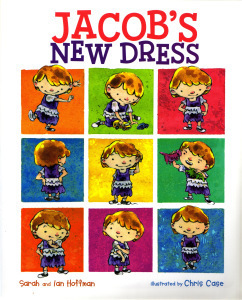Pride Week Guest Post from Sarah & Ian Hoffman: The Road We Travel
We have a teacher friend who’s been an long-standing champion for inclusiveness. Thirty years ago she was a founder of an excellent progressive school in the Bay Area. This teacher was recently reviewing the school’s charter, where she noticed it said the school would provide an “excellent education for boys and girls.”

Albert Whitman & Company, March 2014.
“We wouldn’t write that today,” she said. “We wouldn’t get stuck in that binary way of thinking. Back then the idea was we would provide an appropriate education for boys in a coed environment, and an appropriate education for girls in a coed environment. Like there were boy brains over on this side, and girl brains over on that side. It never quite made sense to me, but that’s where educational theory was back then.”
Two recent interviews, one on NPR and the other in the New York Times, show how much thinking has changed in thirty years.
Famed British comedian Eddie Izzard–who used to perform in full drag–charmingly explained his take on clothes, gender, and sexuality on a recent NPR Morning Edition interview. Among the highlights was this exchange:
NPR: “Can I ask you something that we don’t normally ask our guests at Morning Edition, even when they’re in another office? You’re in our New York bureau. I’m in Washington. I can’t see you, but can you tell me what you’re wearing today for the interview?”
Izzard: “Ah, mainly clothes. Mainly clothes.”

Eddie Izzard.
NPR: “That’s–that’s good.”
Izzard: “You’re trying to go down this transvestite line, but you wouldn’t ask Hilary Clinton that. So that’s why I’m going to keep…. I’m just wearing clothes, whether any of it’s supposed to be men’s clothes or women’s clothes, I don’t agree with that–that thing. I think the United Nations should have something in there that says you can wear what the hell you want to.”
NPR: “That’s fair enough. Fair enough.”
Izzard–a self described “straight transvestite”–talked about how his appearance has little to do with what he’s capable of as a performer. “[T]here’s a big slice of boy genetics going on in me, plus the extra girly genetics. It has nothing to do with the comedy. My comedy is my comedy. My drama is my drama.” He continued that transgender needs to get to the status that gay currently enjoys: “boring.”
The topic of gender dealt with, Izzard and NPR went on to a long discussion about Izzard’s current work and the business of being funny.

Laverne Cox.
Laverne Cox, a transgender actress starring in “Orange is the New Black,” touched on similar topics in a recent New York Times interview.
NYT: Sophia is the first transgender person a lot of audiences will be exposed to, and she’s in prison. Do you worry that’s sending the wrong message?
Cox: I think our show really makes it explicit that just because someone is incarcerated does not mean they are no longer a human being. We can’t talk about America without talking about this. We incarcerate more people than anybody else in the world. I’m not interested in this false dichotomy around positive versus negative representation. It does not allow for the complexity and the nuance and the full humanity of character.
NYT: Is it a burden to be known as a transgender actress–not just an actress?
Cox: Yeah, but at the same time I think it’s important to empower being trans. Most of the narrative around trans identity has been about transitioning. You blend in, and that is the goal, but blending in was never an option for me. Some people are going to know that we’re trans. There’s nothing wrong with that.
NYT: Will we live to see a day when there’s a transgender crime-scene investigator on a “C.S.I.” spinoff?
Cox: This is my dream! This is my dream! I actually believe it is possible.
From boy brains and girl brains to considering the possibility of a trangender C.S.I. crime-scene investigator. It was just a decade ago when our son Sam, aged two, found his love for what are generally considered “girl things.” First pink sneakers, then pink t-shirts, then princess dress-up costumes and tiaras and fairy wings. For some time, we were the only parents we knew with a boy like this, and Sam was certainly not reflected in popular culture in any positive way. Now we have Eddie Izzard and Laverne Cox expressing thoughtful and nuanced positions about gender where everyone can hear them.
This June, it’s good to pause and see how far we’ve traveled on the road to acceptance. There’s a long ways to go, but we’re definitely on our way.
Happy Pride Week!
-Sarah & Ian Hoffman
Sarah and Ian Hoffman are the parents of a pink boy and a girl whose favorite color is yellow. Sarah writes for national magazines, newspapers, and radio, and speaks publicly about raising her gender-nonconforming son. Ian writes children’s books. They use pseudonyms to protect the safety of their family.








